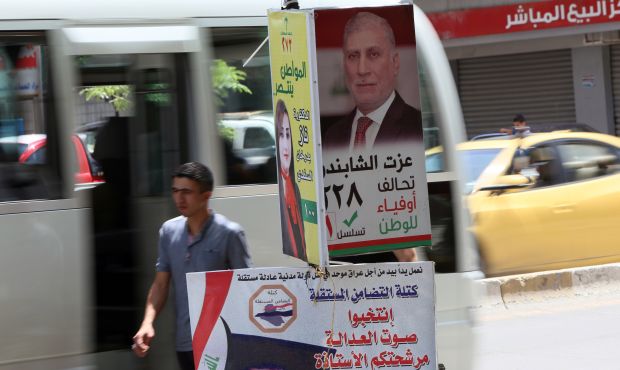
An Iraqi man walks past campaign posters as he walks on a street in the capital, Baghdad, on April 29, 2014. (AFP/Ali Al-Saadi)
Baghdad, Asharq Al-Awsat—As Iraqis across the country prepare to head to the polls on Wednesday, several parliamentary hopefuls are already complaining of electoral violations.
Candidates have raised questions about the issuance of voter’s e-cards, in addition to calling for investigations into members of Iraq’s military and security forces being pressured to vote for specific candidates. Iraqi military and police personnel began voting on Monday.
In comments to Asharq Al-Awsat independent MP Izzat Al-Shahbandar criticized Iraqi prime minister Nuri Al-Maliki’s State of Law coalition for putting “pressure” on government bodies in order to secure as many votes as possible.
“Violations have taken place in several election centers, and pressure is being put on members of the police and military to vote for a specific candidate.”
Shahbandar, a former member of Maliki’s State of Law coalition, said that the Iraqi prime minister is desperate to win the election outright, without having to resort to forming alliances to secure a third term in office.
Zafer Al-Ani, an MP with the Mutahidoun Movement that is considered one of the main rivals to Maliki’s coalition, raised questions about the issuance and distribution of e-cards. He told Asharq Al-Awsat: “Major violations have been committed in the issuance and distribution of voter’s e-cards,” he said, also echoing Shahbandar’s claims that pressure is being exerted on Iraq’s armed forces to vote in a particular way.
“Members of the security and military forces were ordered to vote for a specific party and specific figure,” Ani said in reference to Maliki and the State of Law.
“Soldiers and police officers consider the instructions their commanders issue as the equivalent of military orders which must be obeyed,” he said.
Ani also claimed that the government is pursuing a policy of arresting Sunni voters ahead of the elections as “part of a premeditated plan to prevent voters from reaching ballot boxes and a message against voting for Mutahidoun.”
The government has increased security across Iraq ahead of elections to deal with the escalation of violence. A string of attacks were reported on security checkpoints and polling stations across the country on Monday, killing more than 20 people. A pair of bombs ripped through an outdoor market in Baghdad on Tuesday, killing at least 17 people and wounding 42, officials said.
In other news from Iraq, President Jalal Al-Talabani made his first public appearance since he was hospitalized following a minor stroke two years ago. He was shown casting his vote in the elections from Berlin on Monday.
Reporting contributed by Maad Fayad from London, and Hamza Mustafa and Mohamed Zanganeh from Baghdad
